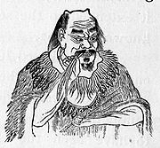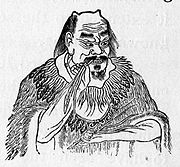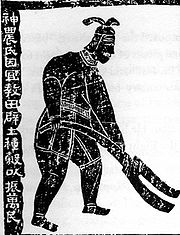
Shennong
Encyclopedia

Pinyin
Pinyin is the official system to transcribe Chinese characters into the Roman alphabet in China, Malaysia, Singapore and Taiwan. It is also often used to teach Mandarin Chinese and spell Chinese names in foreign publications and used as an input method to enter Chinese characters into...
Wǔgǔxiāndì), was a legendary ruler of China and culture hero
Culture hero
A culture hero is a mythological hero specific to some group who changes the world through invention or discovery...
reputed to have lived some 5,000 years ago. Shennong has been thought to have taught the ancient Chinese not only their practices of agriculture
Agriculture
Agriculture is the cultivation of animals, plants, fungi and other life forms for food, fiber, and other products used to sustain life. Agriculture was the key implement in the rise of sedentary human civilization, whereby farming of domesticated species created food surpluses that nurtured the...
, but also the use of herbal drugs.
"Shennong" can also be taken to refer to his people, the Shennong-shi (t , s , p
Pinyin
Pinyin is the official system to transcribe Chinese characters into the Roman alphabet in China, Malaysia, Singapore and Taiwan. It is also often used to teach Mandarin Chinese and spell Chinese names in foreign publications and used as an input method to enter Chinese characters into...
Shénnóngshì) or "Clan of Shinong". Since shì can mean both "clan" and "maiden name" and serve as a masculine honorific such as "mister" or "sir", it also is used sometimes in reference to his people, sometimes in reference to the individual.
Mythology

Chinese mythology
Chinese mythology is a collection of cultural history, folktales, and religions that have been passed down in oral or written tradition. These include creation myths and legends and myths concerning the founding of Chinese culture and the Chinese state...
Shennong, besides having taught humans the use of the plow together with other aspects of basic agriculture, the use of medicinal plants, and having been a god of the burning wind (perhaps in some relationship to the Yan Emperor
Yan Emperor
The Yan Emperor, or Yandi was a legendary Han Chinese ruler who lived in pre-dynastic China. Modern scholarship has identified the Sheep's Head Mountains just north of Gaoping in Shanxi Province as his homeland and territory....
mythos and/or slash-and-burn agriculture, in which the ash produced by fire fertilizes the fields), was sometimes said to be a progenitor to, or to have had appointed as one of his ministers, Chi You
Chi You
Chi You was a tribal leader of the ancient nine Li tribe . He is best known as the tyrant who fought against the then-future Yellow Emperor during the Three Sovereigns and Five Emperors era in Chinese mythology. For the Hmong people, Chi You was a sagacious mythical king...
; and like him, they were both ox
Ox
An ox , also known as a bullock in Australia, New Zealand and India, is a bovine trained as a draft animal. Oxen are commonly castrated adult male cattle; castration makes the animals more tractable...
-headed, sharp-horned, bronze-foreheaded, and iron-skulled. One difference between mythology
Mythology
The term mythology can refer either to the study of myths, or to a body or collection of myths. As examples, comparative mythology is the study of connections between myths from different cultures, whereas Greek mythology is the body of myths from ancient Greece...
and science
Science
Science is a systematic enterprise that builds and organizes knowledge in the form of testable explanations and predictions about the universe...
is exemplified in Chinese mythology: Shennong and Huangdi (often known as "the Yellow Emperor") were supposedly friends and fellow scholars, despite the 500 years or seventeen or eighteen generations between the first Shennong and Huangdi; and, that together they shared the alchemical secrets of medicine, immortality, and making gold.
According to the eighth century CE historian Sima Zhen
Sima Zhen
Sima Zhen , courtesy name Zizheng , was a Chinese historian born in what is now Jiaozuo, Henan during the Tang Dynasty.Sima Zhen was one of the most important commentators on the Shiji...
's commentary to the second century BCE Shiji (or, Records of the Grand Historian), Shennong is a kinsman of the Yellow Emperor
Yellow Emperor
The Yellow Emperor or Huangdi1 is a legendary Chinese sovereign and culture hero, included among the Three Sovereigns and Five Emperors. Tradition holds that he reigned from 2697–2597 or 2696–2598 BC...
and is said to be an ancestor
Ancestor
An ancestor is a parent or the parent of an ancestor ....
, or a patriarch
Patriarch
Originally a patriarch was a man who exercised autocratic authority as a pater familias over an extended family. The system of such rule of families by senior males is called patriarchy. This is a Greek word, a compound of πατριά , "lineage, descent", esp...
, of the ancient forebears of the Chinese. The Han Chinese
Han Chinese
Han Chinese are an ethnic group native to China and are the largest single ethnic group in the world.Han Chinese constitute about 92% of the population of the People's Republic of China , 98% of the population of the Republic of China , 78% of the population of Singapore, and about 20% of the...
regarded them both as their joint ancestors.
Historicity
Shennong cannot be said to be a completely historical figure. However, Shennong, individual and clan, are very important, in the history of cultureCultural history
The term cultural history refers both to an academic discipline and to its subject matter.Cultural history, as a discipline, at least in its common definition since the 1970s, often combines the approaches of anthropology and history to look at popular cultural traditions and cultural...
-- especially in regards to mythology
Mythology
The term mythology can refer either to the study of myths, or to a body or collection of myths. As examples, comparative mythology is the study of connections between myths from different cultures, whereas Greek mythology is the body of myths from ancient Greece...
and popular culture
Popular culture
Popular culture is the totality of ideas, perspectives, attitudes, memes, images and other phenomena that are deemed preferred per an informal consensus within the mainstream of a given culture, especially Western culture of the early to mid 20th century and the emerging global mainstream of the...
. Indeed, Shennong figures extensively in historical literature
History of literature
The history of literature is the historical development of writings in prose or poetry which attempts to provide entertainment, enlightenment, or instruction to the reader/hearer/observer, as well as the development of the literary techniques used in the communication of these pieces. Not all...
.
Shennong in literature
Sima QianSima Qian
Sima Qian was a Prefect of the Grand Scribes of the Han Dynasty. He is regarded as the father of Chinese historiography for his highly praised work, Records of the Grand Historian , a "Jizhuanti"-style general history of China, covering more than two thousand years from the Yellow Emperor to...
mentions that the rulers directly preceding the Yellow Emperor
Yellow Emperor
The Yellow Emperor or Huangdi1 is a legendary Chinese sovereign and culture hero, included among the Three Sovereigns and Five Emperors. Tradition holds that he reigned from 2697–2597 or 2696–2598 BC...
were of the house (or societal group) of Shennong. Sima Zhen
Sima Zhen
Sima Zhen , courtesy name Zizheng , was a Chinese historian born in what is now Jiaozuo, Henan during the Tang Dynasty.Sima Zhen was one of the most important commentators on the Shiji...
, who added a prologue for the Shiji, said his surname was Jiang
Jiang
Jiang may refer to:*Jiang , several Chinese surnames*Kang , or Jiang, Korean surname*Jiang River, an ancient river of China*Jiang , rank held by general officers in the military of China*Jiang County, in Shanxi, China...
(姜), and proceeded to list his successors. An older and more famous reference is in the Huainanzi
Huainanzi
The Huáinánzǐ is a 2nd century BCE Chinese philosophical classic from the Han dynasty that blends Daoist, Confucianist, and Legalist concepts, including theories such as Yin-Yang and the Five Phases. It was written under the patronage of Liu An, Prince of Huainan, a legendarily prodigious author...
; it tells how, prior to Shennong, people were sickly, wanting, starved and diseased; but he then taught them agriculture, which he himself had researched, eating hundreds of plants — and even consuming seventy poisons in one day. Shennong also features in the book popularly known in English as I Ching
I Ching
The I Ching or "Yì Jīng" , also known as the Classic of Changes, Book of Changes and Zhouyi, is one of the oldest of the Chinese classic texts...
. Here, he is referenced as coming to power after the end of the house (or reign) of Paoxi (Fu Xi), also inventing a bent-wood plow, a cut-wood rake, teaching these skills to others, and establishing a noonday market. Another reference is in the Lüshi Chunqiu
Lüshi Chunqiu
The Lüshi Chunqiu is an encyclopedic Chinese classic text compiled around 239 BCE under the patronage of the Qin Dynasty Chancellor Lü Buwei...
, mentioning some violence with regard to the rise of the Shennong house, and that their power lasted seventeen generations.
The various subsequent notices of Shennong include Anthony Christie's Chinese Mythology, which references Shennong (as Shen-nung) six times, three times with pictures, according to the 1968 index.
In popular culture

Herb
Except in botanical usage, an herb is "any plant with leaves, seeds, or flowers used for flavoring, food, medicine, or perfume" or "a part of such a plant as used in cooking"...
s to test their medical value. The most well-known work attributed to Shennong is The Divine Farmer's Herb-Root Classic , first compiled some time during the end of the Western Han Dynasty — several thousand years after Shennong might have existed. This work lists the various medicinal herbs, such as lingzhi, that were discovered by Shennong and given grade and rarity ratings. It is considered to be the earliest Chinese pharmacopoeia
Pharmacopoeia
Pharmacopoeia, pharmacopeia, or pharmacopoea, , in its modern technical sense, is a book containing directions for the identification of samples and the preparation of compound medicines, and published by the authority of a government or a medical or pharmaceutical society.In a broader sense it is...
, and includes 365 medicines derived from minerals, plants, and animals. Shennong is credited with identifying hundreds of medical (and poisonous) herb
Herb
Except in botanical usage, an herb is "any plant with leaves, seeds, or flowers used for flavoring, food, medicine, or perfume" or "a part of such a plant as used in cooking"...
s by personally testing their properties, which was crucial to the development of Traditional Chinese medicine
Traditional Chinese medicine
Traditional Chinese Medicine refers to a broad range of medicine practices sharing common theoretical concepts which have been developed in China and are based on a tradition of more than 2,000 years, including various forms of herbal medicine, acupuncture, massage , exercise , and dietary therapy...
. Legend holds that Shennong had a transparent body, and thus could see the effects of different plants and herbs on himself. Tea
Tea
Tea is an aromatic beverage prepared by adding cured leaves of the Camellia sinensis plant to hot water. The term also refers to the plant itself. After water, tea is the most widely consumed beverage in the world...
, which acts as an antidote against the poisonous effects of some seventy herbs, is also said to have been his discovery. Shennong first tasted it, traditionally in ca. 2737 BC, from tea leaves on burning tea twigs, after they were carried up from the fire by the hot air, landing in his cauldron of boiling water. Shennong is venerated as the Father of Chinese medicine. He is also believed to have introduced the technique of acupuncture
Acupuncture
Acupuncture is a type of alternative medicine that treats patients by insertion and manipulation of solid, generally thin needles in the body....
.
Shennong is said to have played a part in the creation of the Guqin
Guqin
The guqin is the modern name for a plucked seven-string Chinese musical instrument of the zither family...
, together with Fuxi and the Yellow Emperor
Yellow Emperor
The Yellow Emperor or Huangdi1 is a legendary Chinese sovereign and culture hero, included among the Three Sovereigns and Five Emperors. Tradition holds that he reigned from 2697–2597 or 2696–2598 BC...
. Scholarly works mention that the paternal family of famous Song Dynasty
Song Dynasty
The Song Dynasty was a ruling dynasty in China between 960 and 1279; it succeeded the Five Dynasties and Ten Kingdoms Period, and was followed by the Yuan Dynasty. It was the first government in world history to issue banknotes or paper money, and the first Chinese government to establish a...
General Yue Fei
Yue Fei
Yue Fei , style name Pengju, was a military general of the Southern Song Dynasty. His ancestral home was in Xiaoti, Yonghe Village, Tangyin, Xiangzhou, Henan...
traced their origins back to Shennong.
See also
- Descendants of Yan & Huang Emperors
- List of Chinese physicians
- Medicinal mushroomsMedicinal mushroomsMedicinal mushrooms are mushrooms, or mushroom extracts, that are used or studied as possible treatments for diseases. Lentinula edodes , Grifola frondosa , Ganoderma lucidum , and Cordyceps, have a history of medicinal use spanning millennia in parts of Asia...
- Shennong Stream
- Song YingxingSong YingxingSong Yingxing , born in Yichun of Jiangxi, was a Chinese scientist and encyclopedist who lived during the late Ming Dynasty . He was the author of an encyclopedia that covered a wide variety of technical subjects, including the use of gunpowder weapons...
- Three Sovereigns and Five Emperors
- Yandi
- Yellow EmperorYellow EmperorThe Yellow Emperor or Huangdi1 is a legendary Chinese sovereign and culture hero, included among the Three Sovereigns and Five Emperors. Tradition holds that he reigned from 2697–2597 or 2696–2598 BC...
External links
- http://140.111.1.40/yitia/fra/fra04111.htm variants on the nóng character.
- http://the-tea-site.com/shen-nong.php Shen Nong and Tea - Article for The Tea Site (official page).

